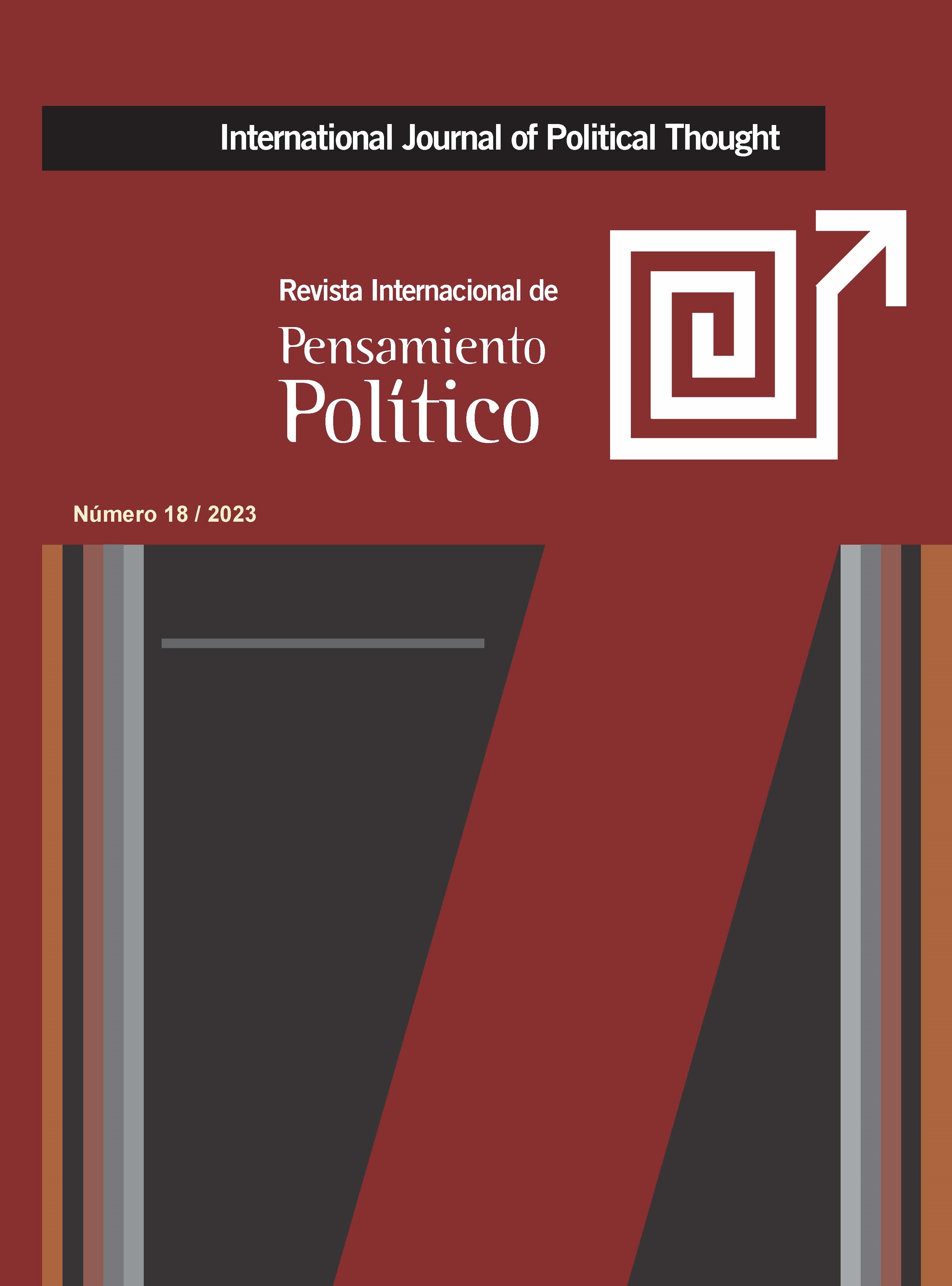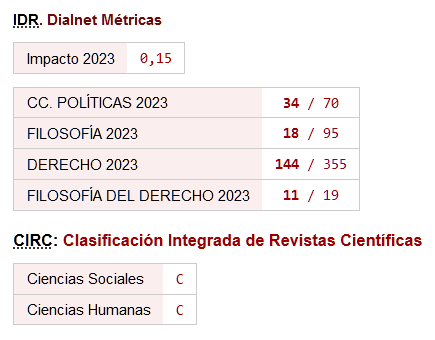Représentation féminine et reconfiguration du système électoral
Regards sur les élections législatives au Maroc
DOI:
https://doi.org/10.46661/revintpensampolit.8475Palabras clave:
Représentation féminine, système électoral, Maroc, découpage électoral, seuil, scrutin proportionnel de listeResumen
Au Maroc comme ailleurs, la représentation de la femme au sein des assemblées élues peine à s’affirmer. Au-delà du débat classique centré sur la promotion culturelle de l’image féminine, il est temps que soit prêtée une attention particulière à la reconfiguration du système électoral, comme levier indispensable à l’émancipation politique de la femme. Hésitant longtemps entre les manettes: juridique et culturelle, le décideur se doit d’actionner en urgence la première, moyennant la mise en place d’un mode de scrutin aussi proportionnel que possible. Optant ainsi pour un découpage du territoire en grandes circonscriptions à magnitude élevée, réduisant au strict minimum le gaspillage des voix, maintenant le seuil à un niveau raisonnablement élevé, et décrétant l’usage des listes bloquées, le législateur garantirait une présence féminine honorable sur l’arène de la compétition électorale.
Descargas
Citas
Adnane, A (2008). Géographie politique marocaine et comportements électoraux, Rabat, Mémoire préparé pour l’obtention du diplôme des études supérieures approfondies en sciences politiques, Faculté des sciences juridiques économiques et sociales de Rabat.
Savic, CI (2022). la Réforme électorale Et les Femmes En Politique Au québec, Montréal, Mémoire Présenté comme exigence partielle de la maîtrise en science politique, université Du québec.
AP.CE «Assemblée parlementaire, conseil de l’Europe», Commission ad hoc du Bureau (2016). Observation des élections législatives au Maroc (7 octobre 2016), Rapport d’observation d’élection, Rapporteur: M. Ian lIDDEll-GRAINGER, Royaume-uni,
CE.CNDH «Conseil national des droits de l’Homme» (2013), Atelier d’échange et de partage des expériences sur l’observation des élections législatives du 25 novembre 2011, Publications du Conseil national des droits de l’Homme, Série “Séminaires”.
HORWILL, G (1925). Proportional Representation: Its Dangers and Defects, londres, Allen and unwin.
International IDEA c «International Institue for Democracy and International Assistance» (2002). La Conception Des Systèmes Électoraux Un Manuel de Inter-national IDEA, édition française.
International IDEA f «International Institue for Democracy and International Assistance» (2002), Les Femmes Au Parlement: Audelà du nombre, série Manuels, édition française.
Leveau, R (1976). Le Fellah défenseur du trône, Paris, FNSP.
REMALD» Revue marocaine d’Administration locale et de développement» (2003). Tout sur l’élection du 27 sep-tembre 2002, collection: textes et documents, n° 73.
Mouline, N (2016). Le Maroc vote: les élections législatives en chiffres (1963-2011), éditions: tel quel Media/ Centre Jacques Berque, 2016.
Pippa, N (2004). Electoral engineering: voting rules and political behavior, Cam-bridge: Cambridge university Press.
REMALD» Revue marocaine d’Administration locale et de développement» (2008). Tout sur les élections 2007, collection: textes et documents, n° 194.
REMALD» Revue marocaine d’Administration locale et de développement» (2022). Tout sur les élections 2021, collection: textes et documents», n° 320.
Brechenmacher, S. (2018), tackling women’s underrepresentation in u.S. Politics. Comparative Perspectives from Europe, Carnegie Endowment for Interna-tional Peace. <https://www.representwo-men.org/tackling_women_s_under_re-presentation_in_us_politics>.
Taagepera R., Shugart M.S. (1989), Seats and Votes. the Effects and Determinants of Electoral Systems , New Haven, yale university Press. https://doi.org/10.1016/0261-3794(89)90021-8 DOI: https://doi.org/10.1016/0261-3794(89)90021-8
Arend, L. (1990), «The Political Consequences of Electoral Laws, 1945-85», The American Political Science Review, Vol. 84, ,n°. 2 ,Juin, p. 481-496, Published By: American Political Science Association. https://doi.org/10.2307/1963530 DOI: https://doi.org/10.2307/1963530
Aswab M. (2011), «Statistiques: Les élections législatives en chiffres», in Aujourd'hui le Maroc, 25 Novembre.
Ballmer-Cao, T. & Tremblay, M (2008), «Modes de Scrutin, Partis Politiques et Élection Des Femmes: Une Introduction », Swiss Political Science Review, 14.4, p.609-30. https://doi.org/10.1002/j.1662-6370.2008.tb00114.x DOI: https://doi.org/10.1002/j.1662-6370.2008.tb00114.x
Beauvallet, W. & Michon, S. (2008), «L'Impact Du Mode de Scrutin Européen Sur l'Élection Des Femmes Au Parlement Européen En France : Une Dynamique Associant Règles Juridiques et Stratégies Politiques», in Politique Européenne, n°. 24, Dieu Loin de Bruxelles. https://doi.org/10.3917/poeu.024.0123 DOI: https://doi.org/10.3917/poeu.024.0123
L'européanisation Informelle Du Religieux, 24, éditions: L'Harmattan, p. 123-43.
Bennani-chraïbi, M, (2002), «Représenter et Mobiliser Dans l'élection Législative Au Maroc. Les Législatives 2002», in Scènes et Coulisses de l'élection Au Maroc, Sous-Direction : Mounia Bennani- Chraïbi, Myriam Catusse et Jean-Claude Santucci, IREMAN-KRTHALA, p. 15-53. https://doi.org/10.4000/books.iremam.647 DOI: https://doi.org/10.4000/books.iremam.647
Bennani-Chraïbi, M. (2008), «Hommes d'affaires versus profs de Fac. La Notabilisation Parlementaire d'un Parti de Militants Au Maroc», Revue Internationale de Politique Comparée, 15.2, p. 205-219. https://doi.org/10.3917/ripc.152.0205 DOI: https://doi.org/10.3917/ripc.152.0205
Bennani-Chraïbi, M. (2013), «L'Espace Partisan Marocain: Un Microcosme Polarisé? », Revue Française de Science Politique, 2013, volume.63, p.1166-1192. https://doi.org/10.3917/rfsp.636.1163 DOI: https://doi.org/10.3917/rfsp.636.1163
Catusse, M. (2000), «Économie Des Élections Au Maroc», Maghreb - Machrek, n° 168.2, p.51-66. https://doi.org/10.3917/machr1.168.0051 DOI: https://doi.org/10.3917/machr1.168.0051
Engstrom, R. (1987), «District magnitude and the election of women to the Irish Dail»,: Electoral Studies, Vol. 6, n°. 2, p. 123-132. https://doi.org/10.1016/0261-3794(87)90019-9 DOI: https://doi.org/10.1016/0261-3794(87)90019-9
Enhaili, A. (2006), «Femmes, développement humain et participation politique au Maroc», in Publications du Centre GLORIA, Centre Interdisciplinaire, Herzliya, Volume 1, n° 1, Article 7 - Juillet.
Matland, R E. Dwigh Brown, D. (1992), «District Magnitude's Effect on Female Representation» in State Legislatures, in: Legislative Studies Quarterly, 17, 1, p.469-492. https://doi.org/10.2307/439862 DOI: https://doi.org/10.2307/439862
Saaf, A. (1992). «Tendances actuelles de la culture politique des élites marocaines» in Santucci, J. (Ed.), Le Maroc actuel: Une modernisation au miroir de la tradition ? Institut de recherches et d'études sur les mondes arabes et musulmans. p. 233-249. https://doi.org/10.4000/books.iremam.2428 DOI: https://doi.org/10.4000/books.iremam.2428
Tafani, P. (2005), «Du clientélisme politique », in Revue du MAUSS, 2005/1 (n° 25), p. 259-286. DOI: 10.3917/ rdm.025.0259. URL: https://www.cairn.info/revue-du-mauss-2005-1-page-259.htm https://doi.org/10.3917/rdm.025.0259 DOI: https://doi.org/10.3917/rdm.025.0259
Vairel, F. (2007), «La «liste nationale» : Un quota électoral pourquoi faire ?», in Terrains de campagne au Maroc. Les élections législatives de 2007, Publications: Karthala.
Veguilla, V. (2007), «Les Limites d'une Analyse Tribale Du Vote à Dakhla Entre Notabilisation Des Élections et Diversification Des Registres de Légitimation Politique.», in Terrains de Campagnes Au Maroc. Les Élections Législatives de 2007, p.131-48.
Dahir n° 1-16-118 du 10 Aout 2016, portant promulgation de la loi organique n0 20-16, modifiant et complétant la loi organique n° 27-11 relative à la chambre des représentants. (BO n° 6496 du 1er Septembre 2016).
Dahir 1-02-187 du 3 juillet 2002 portant promulgation de la loi organique n° 06-02, modifiant et complétant la loi organique n° 31-97 relative à la chambre des représentants (BO n° 5018 du 4 juillet 2002).
Dahir 1-07-60 du 23 Mars 2007 portant promulgation de la loi organique n° 22-06, modifiant et complétant la loi organique n° 31-97 relative à la chambre des représentants (BO n° 5514 du 5 Avril 2007).
Dahir 1-11-165 du 14 Octobre 2011 portant promulgation de la loi organique n° 27-11 relative à la chambre des représentants, modifiant et complétant la loi organique n° 31-97 relative à la chambre des représentants (BO n° 5992 du 3 Novembre 2011).
Dahir n° 1-21-39 du 21 Avril 2021, portant promulgation de la loi n° 04-21, modifiant et complétant la loi organique n° 27-11 relative à la chambre des représentants. (BO n° 7000 du 1er Juillet 2021).
Descargas
Publicado
Cómo citar
Número
Sección
Licencia
Derechos de autor 2023 Abdelali Adnane

Esta obra está bajo una licencia internacional Creative Commons Atribución-NoComercial-CompartirIgual 4.0.
Política de acceso abierto
Se permite el acceso libre y abierto de cualquier interesado a todos los contenidos de los números de la revista, sin costo alguno, pudiendo imprimir y trasladar todos los artículos, con la única condición de precisar la fuente y la autoría.
La revista: a) no cobra a las autorías costes por el procesamiento de los artículos ni por el envío de los mismos, b) mantiene el copyright para los autores sin restricciones, c) facilita a los autores conservar sus derechos de publicación sin limitaciones.
La Revista Internacional de Pensamiento Político es una obra original del Laboratorio de Ideas y Prácticas Políticas de la Universidad Pablo de Olavide. Todos los artículos incluidos en la Revista son obra original de sus respectivas autorías. Esta Revista se ofrece libremente a la comunidad científica y académica sin coste alguno y libera los contenidos de acuerdo a la licencia "Reconocimiento-NoComercial-CompartirIgual 4.0 CC BY-NC-SA" del proyecto Creative Commons dispuesta en la siguiente url: https://creativecommons.org/licenses/by-nc-sa/4.0/legalcode
Si deseas traducir o compilar alguno de los artículos aquí disponibles, por favor, ponte en contacto













